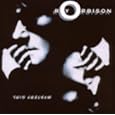 There is that whole thing about having a good voice and being a good singer. And they are not the same thing. You could have a great voice and not have a clue what to do with it. Think Barbra Streisand [ducks the tomatoes], or Whitney Houston. And you could be a great singer and have no voice to speak of. Think the obvious – Bob Dylan.
There is that whole thing about having a good voice and being a good singer. And they are not the same thing. You could have a great voice and not have a clue what to do with it. Think Barbra Streisand [ducks the tomatoes], or Whitney Houston. And you could be a great singer and have no voice to speak of. Think the obvious – Bob Dylan.Or you could be Roy Orbison, who had a operatic range, a great voice, and a delivery that made every single note he sang meaningful and believable.

The bulk of this is from The All Time Greatest Hits Of Roy Orbison, a double album that contains most of his Monuement hits; that was from 1960 – 1964. I got his Sun recordings from The Legendary Roy Orbison, a box set, and Ride Away came from there and some other MGM singles, and a few tracks came from More Of Roy Orbison’s Greatest Hits, which was released in the 60s, and then there are a few actual singles, all of which were MGM releases. And You Got It comes straight from Mystery Girl.
Roy Orbison:
• Ooby Dooby – From the summer of 1956 and the only one of his Sun recordings to make the top 100. The rockabilly elements are toned down somewhat, for a Sun release. CCR covered this on Cosmo’s Factory, and they didn’t change much about it.
• Rock House – A song about a discotheque before such a thing existed. Not the Ray Charles song.
• Devil Doll – A song about a troubled relationship. Always good to demonize your significant other.
• Tryin’ To Get To You – Elvis had a crack at this, also on Sun, and Ricky Nelson did it a year or two later. Kate & Anna McGarrigle did it also.
• Claudette – There was a Claudette who worked as a phone operator at Duffy’s Taxi in Winnipeg, back a million years ago when I was a taxi driver. The Everly Brothers did this, and did it better. Orbison wrote it.
• Sweet And Innocent – I can’t tell whether this is the Donny Osmond song; I don’t think so…
• Only The Lonely – Orbison gets signed by Monument, and in the summer of 1960 his career takes off. This track hit number 2 in the summer of 1960. I can’t do better here than to quote Dave Marsh, in The Heart Of Rock & Soul: “’Only The Lonely’ has…a lyric that renders everyday heartbreak so universal that it acquires a tinge of the cosmic.”
• Leah – Orbison’s obsession with the girl Leah is underlined by percussion, congas first, then steel drums. This is all sea-borne, as Roy searches for the perfect pearl. Then he wakes up. A hit in the fall of 1962.
• In Dreams – Sleep as escape. This was a hit in the winter of 1963.
• Uptown – Not The Crystals song, and Whitburn lists it as “Up Town.” A hit in the winter of 1960, before Only The Lonely. Wealth as salvation.
• It’s Over – The end of a romance, described with such dramatic abandon that the entirety of the human condition may be here. From the spring of 1964.
• Crying – This basically sums up Orbison’s entire repertoire. From the fall of 1961. Jay & The Americans put this on the charts a few years later, and Don McLean did again a few decades later.
• Dream Baby – A bit uptempo. From the winter of 1962. All I Have To Do Is Dream, sang The Everly Brothers, and Roy Orbison picks up the theme. In In Dreams he was sleep dreaming; here he is awake dreaming. But the idea is the same.
• Blue Angel – From the fall of 1960. I don’t really know whether this has anything to do with the Marlene Dietrich movie.
• Working For The Man – Sounds like someone resigned to his life as a working man, until you realize that his ambition is to become “the man.” Picks up where Uptown leaves off. Echoes of Chain Gang. From the fall of ’62, the B side of Leah.
• Candy Man – Not the Woody Guthrie song, nor the Sammy Davis Jr. song. From the fall of ’61, the flip side of Crying. One need not wonder what kind of candy he is offering.
• Running Scared – The threat here is the other guy. What if he comes back? There’s a bolero rhythm here that climaxes in her choice. I won’t spoil it. This song was number 1 in the summer of 1961.
• Falling – Falling in love is what he means. But the emphasis on the “falling” aspect of it is not accidental. From the summer of 1963.
• Love Hurts – Yes it does doesn’t it. Sometimes it hurts like hell. And Roy Orbison gets the message across better than anyone…
• Shahadaroba – Is that a name? There is a phony mid-eastern sound to this.
• I’m Hurtin’ – It’s my destiny, sings Roy. Dave Marsh describes him as rock’s greatest stoic. This may be the best example.
• Mean Woman Blues – From the fall of 1963. Originally done by Elvis.
• Pretty Paper – A sad Christmas song. Being lonesome at Christmas time can be poignant, or it can be maudlin, but Roy pulls it off. From Christmas 1963.
• The Crowd – Roy is part of the crowd, but he’s lonesome, because the most important member is missing. From the summer of 1962.
• Blue Bayou – I know the one by Linda Rondstadt, I only heard Orbison’s original later. A song of longing and nostalgia. From the fall of 1963, the B side of Mean Woman Blues.
• Oh, Pretty Woman – From the smash smash smash intro, to that immortal guitar refrain, to Orbison’s growling and “mercy-ing”, it was a dead giveaway that the girl would come back in the end. This was number 1 in the fall of 1964. It wasn’t the last hit Orbison had, but it was the last one that anyone remembers, before his comeback in the 80s, anyway.
• Indian Wedding – He sings as a participant. I think he’s the groom. But then he’s the narrator. It’s confusing. I don’t know what happened to the couple, but whatever it was wasn’t good.
•
 Borne On The Wind – A song of memories, better than Memories. A UK hit in the winter of ’64.
Borne On The Wind – A song of memories, better than Memories. A UK hit in the winter of ’64.• What’d I Say – Seems like everyone had to have a crack at this. Orbison is a bit out of his jurisdiction here.
• (Say) You’re My Girl – This is another Roy Orbison record where he has to compete for the girl. In this he seems to have won, but there’s always that undercurrent of insecurity; it's in the parentheses. A hit in the summer of 1965, but I don’t remember it. It was his last hit on Monument.
• Ride Away – Highway as an escape, think Carefree Highway by Lightfoot. Sort of. His debut hit on MGM, from the fall of 1965.
• Lana – I’ve never known anyone named Lana. This rather generic Orbison record was a hit in the UK in the summer of ’66.
• Twinkle Toes – From the spring of 1966, a song about a dancer. Of course she dances to hide a broken heart. Musically this sounds vaguely like an attempt to bring Oribison into the psychedelic era, fuzz guitars and all. It doesn’t really work.
• Cry Softly Lonely One – An attempted update of Only The Lonely. His singing is as beautiful as ever, but it didn’t really catch on. From the summer of 1967, this was Orbison’s last top 100 hit, until You Got It, released posthumously in 1989.
• Crawling Back – The style is reminiscent of Elvis’ late 50s ballads. Yet another song that finds Orbison grovelling. This was from late 1965.
• Breakin’ Up Is Breaking My Heart – Things were fine, you were mine, just yesterday, sings Roy, Now we’re apart. You wouldn’t think it could happen that way, but it can. From the winter of 1966.
• Goodnight – There is some discrepancy as to whether this is Good Night or Goodnight. I miss the way you say goodnight, sings Roy. Yes. I believe it. From the winter of 1965.
• You Got It – In the wake of the success of The Traveling Wilburies, Jeff Lynne took Roy
 Orbison into the studio, that was in 1988, and he recorded Mystery Girl, from which this song was taken. By the time the album was released Orbison was dead, and so this song became a kind of testament. His vocal abilities are toned down somewhat, which is a shame, but this bringing of Orbison into a new era proves that the concept works.
Orbison into the studio, that was in 1988, and he recorded Mystery Girl, from which this song was taken. By the time the album was released Orbison was dead, and so this song became a kind of testament. His vocal abilities are toned down somewhat, which is a shame, but this bringing of Orbison into a new era proves that the concept works.


No comments:
Post a Comment